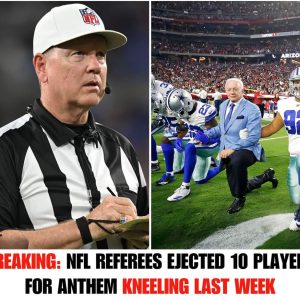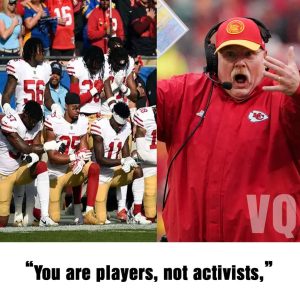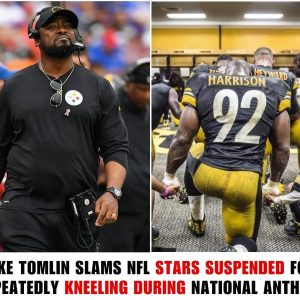In a shocking and controversial move, the NFL has announced a permanent ban on singer Andra Day following her performance of the Black National Anthem at Super Bowl LVIII. The decision has ignited a firestorm of debate, sparking conversations about the role of politics, race, and culture in sports entertainment.
Andra Day, a Grammy-nominated artist known for her soulful voice and powerful performances, was selected to sing “Lift Every Voice and Sing,” often referred to as the Black National Anthem, during the pre-game ceremonies at Super Bowl LVIII. The song, a historic anthem that originated in the early 20th century, has long been a symbol of resilience and hope within the African American community. Its inclusion in the Super Bowl lineup was part of the NFL’s ongoing efforts to promote diversity and inclusion, a focus that has become increasingly prominent in recent years.
However, the decision to have Day perform the anthem was met with mixed reactions. While many praised the NFL for acknowledging the cultural significance of “Lift Every Voice and Sing,” others criticized the move, arguing that it was unnecessarily divisive or that it detracted from the tradition of performing only the national anthem at major sporting events. The controversy reached its peak when the NFL issued a statement declaring that Andra Day would be permanently banned from performing at any future league events.
The announcement has sparked widespread outrage, with many viewing it as a punitive response to the growing movement for racial equality and justice. Critics argue that the ban on Day is not only unjust but also reflective of a broader resistance within certain segments of the sports world to embrace the cultural shifts that are increasingly shaping the American landscape. Social media platforms were ablaze with comments, as fans, athletes, and celebrities weighed in on the decision. Supporters of Day expressed their disappointment and anger, emphasizing the importance of her performance in the context of ongoing social justice efforts.
Legal experts and civil rights advocates have also entered the conversation, questioning the NFL’s decision and what it means for the future of free expression within the league. Some have suggested that the ban could lead to legal challenges, particularly if it is perceived as an infringement on the artist’s rights or as a retaliatory action against her for participating in a culturally significant moment.
The NFL’s stance has also reignited debates about the intersection of sports and politics. While the league has made strides in recent years to address issues of racial inequality and to support initiatives aimed at promoting social justice, this latest decision has raised questions about the sincerity of those efforts. Some commentators have pointed out that the NFL has a history of controversial decisions when it comes to political expression, referencing past incidents involving players and their right to protest.
On the other hand, some supporters of the ban argue that sports should remain a neutral ground, free from political statements or cultural commentary. They believe that the focus of events like the Super Bowl should be solely on the sport itself, and that any deviation from that focus risks alienating portions of the fan base.
As the debate continues, the impact of the NFL’s decision on Andra Day’s career and public image remains to be seen. Day, who has become a prominent figure not just in music but also in activism, has not yet publicly responded to the ban. However, given her track record of speaking out on issues of social justice, it is likely that she will address the situation in the near future.
In the meantime, the controversy surrounding the ban underscores the challenges and complexities that arise when cultural and political issues intersect with mainstream entertainment. The NFL, already under intense scrutiny for its handling of various social issues, now faces the difficult task of navigating the fallout from this decision, which has only deepened the divisions within its fan base and the broader public.
The decision to permanently ban Andra Day marks a significant moment in the ongoing discourse about the role of sports in society. As the league continues to grapple with its identity in a rapidly changing cultural landscape, the repercussions of this decision will likely be felt for years to come, both within the NFL and in the wider world of sports and entertainment.





